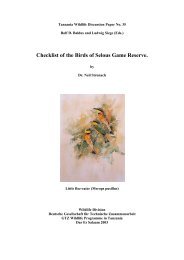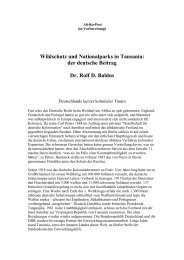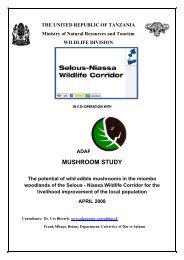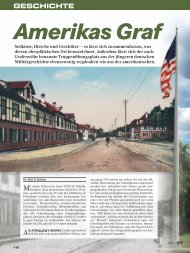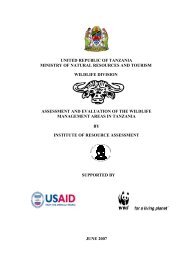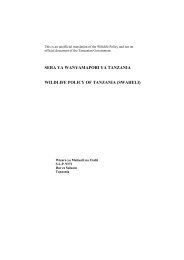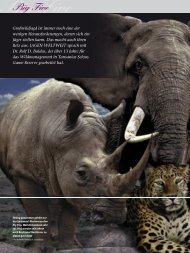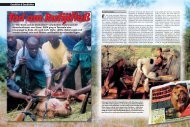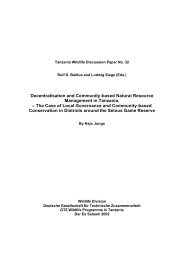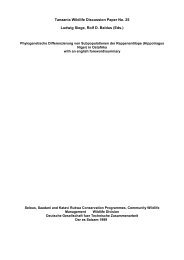African Indaba Articles - wildlife-baldus.com
African Indaba Articles - wildlife-baldus.com
African Indaba Articles - wildlife-baldus.com
Create successful ePaper yourself
Turn your PDF publications into a flip-book with our unique Google optimized e-Paper software.
a) Trophy fees for overseas hunters are significantly higher than average life sale game prices(the difference is even bigger, when factoring in the cost of capturing, transport, insurance,veterinary expenses, etc). Even the considerably lower trophy and/or biltong fees for localhunters are now often higher than live game prices (<strong>com</strong>pare also Table 1)b) Venison must be promoted as acceptable and healthy meat on the local meat retail andrestaurant markets. A regulatory frame work and a marketing platform for significantlyincreasing the export sales to the EU should be created. Venison is a valuable (and oftenunder-priced as <strong>com</strong>pared to lamb, pork or beef) hormone-free organic product with lowcholesterol value for the health conscious 10 . Besides biltong and wors, thousands of recipesare available for tasty dishes.4.2. Two Key SpeciesSouth Africa’s game areas offer a number of key species to the international hunter. Some of them occuronly in this country, others are huntable only here. Regulatory frame works to safeguard the conservation ofthese species within healthy habitats and to maximize the economic benefit from their sustainable use areessential. I will discuss only two species here due to space restrictions, but invite <strong>com</strong>ments regarding theseand other species for future issues of <strong>African</strong> <strong>Indaba</strong>:4.2.1. Black RhinoThe CITES decision to grant South Africa the right to hunt redundant male individuals was overdue andwill have a positive effect on black rhino conservation. I will not discuss details of black rhino conservationhere, but highlight conservation beneficial marketing options. Black rhino conservation is of nationalimportance and incurs high cost to the taxpayer. The animals are notoriously more aggressive and lessvisible than white rhino and therefore are less suitable for non-consumptive eco-tourism. Extractivesustainable use for a few adult bulls from the national population is ideal to raise substantial funds for rhinoconservation 11 .The government tag auctions of the Foundation for North American Wild Sheep (FNAWS) 12 for RockyMountain and Desert Bighorn sheep give a good benchmark. Some of these hunts were auctioned at pricesin excess of $400,000 in the past!The handling of the 5 black rhino permits for 2005 by DEAT left – in my opinion – much to be desired.National and international hunting organizations could have contributed their expertise to the process, butwere not consulted. The ideal approach would have been:For the first year (2005):• Allow hunting only for rhino which are owned and managed by Provincial or NationalAuthorities and market these hunts with international raffles and/or auctions to maximizeeconomic return with the net proceeds going into black rhino conservation• Have PHASA appoint – through an appropriate selection process – a number of highlyqualified and suitable outfitters/professional hunters to conduct these hunts and havePHASA define fair chase guidelines.• Cooperate internationally (with USF&W, EU Commission and Conservation Force) toregulate the export/import of black rhino trophies and create a system to micro-chip legallyobtained trophies for instant recognitionFor subsequent years:10 Prof L C Hoffman, Department of Animal Science, University of Stellenbosch, ”Game meat and South <strong>African</strong> consumers - A healthy delicacy or too rough on thepalate?” and “Tourism and Game Meat – An opportunity we can’t afford to miss?” published also in <strong>African</strong> <strong>Indaba</strong> 2003 and “Sustainable utilization through gamemeat consumption: Current marketing and consumptive trends” Crafford K., Hoffman L.C., Muller M. & Schutte De W., (2002)11 “Trophy Hunting of Black Rhino Diceros bicornis: Proposals to Ensure Its Future Sustainability”, Nigel Leader-Williams, Journal of International Wildlife Law andPolicy, 8:1–11, 200512 Foundation for North American Wild Sheep (FNAWS), 720 Allen Ave, Cody, WY 82414-3402, USA, P:+1(307)527626, Email: fnaws@fnaws.org,Web:www.fnaws.org11



